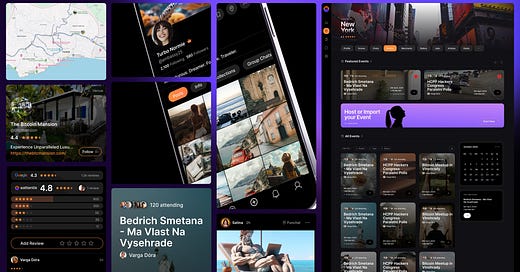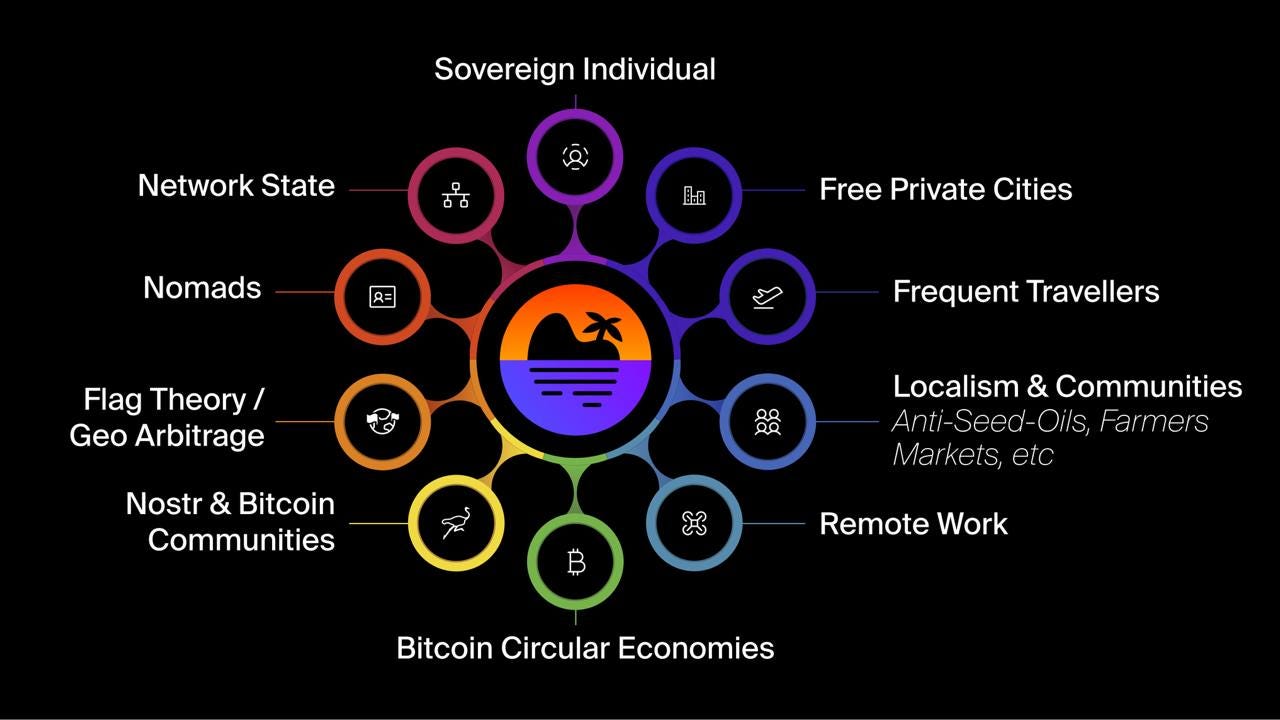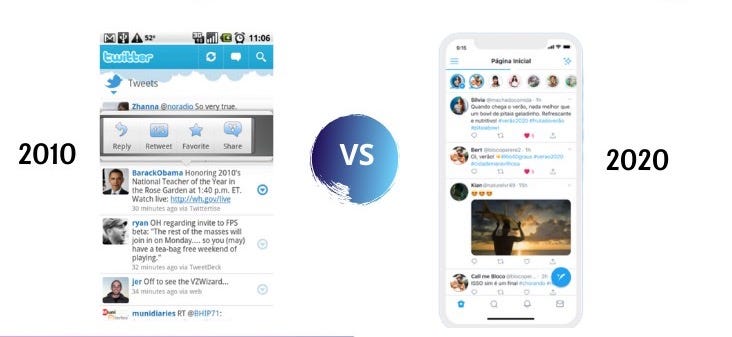Succeeding where FourSquare failed
What is this "Satlantis" thing? A social network? A directory? A super app?
For most of this year, my team and I have been working on a product called Satlantis. I’ve been meaning to write about what it is, and figure that end of the year is an opportune time to do so.
In this short essay, I’ll explore a couple things and answer a few questions along the way, including:
What is Satlantis?
What does the name mean?
Who is it being built for?
What problem does it solve?
Why now?
The answer to the first question is a bit hard to answer without first answering the others, and also diving into a little bit of the history. So let’s start there and by the end of this essay, you’ll hopefully have a better idea of what this project is about.
How & where it all started
In 2023, I was working on The Spirit of Satoshi - a Bitcoin centric LLM that we built our own dataset for and then trained, along with basic RLHF tools (with lightning payouts). We must have trained at least 30 models, maybe more.
By the end of the year, I concluded that even though we started to generate some revenue, there wasn’t really a serious business there. At least not a startup worth investing capital into and scaling.
Around the same time, a seed of another idea had been planted in my mind via two small events.
A friend reached out on Telegram asking if we could train some sort of AI on all the bitcoin-friendly locations around the world to act as a bitcoin-travel-assistant.
My wife and I were in Salvador trying to find a good coffee place, and all the high-rated places on Google sucked. We only found a place thanks to a word of mouth referral.
Robert, (the same friend who reached out to me on Telegram) and I bumped into each other while in Salvador, and in a matter of a couple days, we quickly realised that the AI assistant was the wrong UX. We figured that people need something more visual. Something a bit more like….NomadList. This led us to the originally idea which we not-so-creatively called: “Bitcoin NomadList.”
Long story short (I’ll do a full origin story at some point), we adapted the idea over a few iterations (it was next called Destination Bitcoin, and almost ‘Bastion Bitcoin’) into a sort of social network for bitcoiners and nomads, that we called “Satlantis.”
Why the name?
The name is obviously a play on “Atlantis” and has a few layers of meaning:
S stands for Sovereign. So Satlantis = Sovereign Atlantis, or the “promised land” for Sovereign Individuals.
Atlantis is the ‘lost city’, and Satlantis is a city-centric social network that is surfacing the best infomation about a city or place you may want to visit - that is currently buried under oceans of online junk content, fake reviews and paywalls.
Finally, the Bitcoin origins meant that we wanted to always have something to do with Bitcoin, but didn’t want it to be obvious. Satoshi was the founder, and placing an S at the front of Atlantis gave us a subtle way to related it to Bitcoin, which only those “in the know” would recognise, while “normies” would not.
I’m not sure if this is the name we will ultimately end up with, but for the short to medium term, I believe it does the job.
Who is it for?
Satlantis is for people interested in the following concepts and ideas:
These ideas and the trends they have spawned are not only adjacent but their communities have increasingly commingled and now overlap significantly. It’s like a web or a ‘network’ of people with similar values, desires and interests.
This confluence of interests tells me there is an opportunity to build a social application for them specifically, and that’s basically what Satlantis is.
It’s the “Super App” that if built right, will become the “digital home” for what I estimate to be about 100 million people worldwide (possibly more) at the nexus of these trends, ideas and movements. This number is derived from the following and assumes not all are “active”:
40 million digital nomads worldwide, according to TechReport.com
682.5 million remote workers with about 90.3 million from western countries, according to DemandSage.com.
106 million real bitcoin holders around the world, according to Bitbo.io
Social media in general has transformed the world, and connected all us through various platforms - but no tool has really been built with this audience in mind. I believe there is now an opportunity to build something a little more tailored for THIS specific market, which is more than just a “social media app” but also a directory, an aggregator, a community app and a creator toolkit.
Let’s dive in further..
What problem are we solving?
The trouble with building ‘new things’ is that you are not always “solving” a distinct problem, but often creating a new category. In fact, establishing a new category is often the way to really hit a home run.
When Henry Ford built the car, he wasn’t “solving transport” so much as he was establishing a new category of transport. The combustion engine combined with the discovery and use of gasoline transformed, upgraded and opened the door to a new way to do transport.
It was similar with Steve Jobs and the computer, or with Zuckerberg and Facebook. Zuck didn’t necessarily “solve a specific problem” that people had and were willing to pay for. Rather, he made connecting with people on campus, and later the internet, 100x better. In the process, he helped usher in the second stage of the internet, “Web 2.0,” which was characterized by a shift from static content to user-generated content, and from reading to participating. In other words, a new category.
We’re thinking about Satlantis in much the same way. Our goal is to make the travel experience 100x better, by making creating a new category of product that makes the entire experience more relevant, social and dynamic.
Those three key words are very important because they are the elements of the ‘solution’ we are building. Traveling, nomading or just visiting new places are all fundamentally social experiences. Furthermore, each of us are unique people. We have different interests, values and desires. None of this is taken into account with today’s travel applications. This is a ‘problem’ but one that people have learned to live with because a better way doesn’t yet exist.
There are currently no travel applications on the market that are social or dynamic, and while social apps like Instagram and TikTok are certainly dynamic, they are not purpose-built for travel.
It’s time for that to change. For the first time, both the technology to build this, and the lifestyles, culture and demand exist, for the creation of something new and unique.
A Caveat
We are not going to solve all of the problems with travel overnight, nor will we solve them for everyone. That’s impossible. Instead, and much like Facebook and Tinder who started on campus, our focus is initially narrow. We will upgrade the travel and community experience for Bitcoiners and the subset of Nomads who consider themselves “Sovereign individuals” first. After that, we’ll grow to a wider audience.
We know, not only from being a team full of Bitcoiners, Nomads and self-described Sovereign Individuals, but from having spoken to hundreds of them in person, at conferences, on calls and online, that they are interested in the following things (among others):
Building communities of like-valued and like-minded people.
Discovering venues & merchants (cafe, restaurant, co-working, bar, gym, etc) that align with their values and interests (ie; accept Bitcoin, Seed Oil Free, Farm to Table, Anti-Blue-Light, etc).
Attending particular events that align with their interests (meetups, conferences, retreats, festivals, summits, private gatherings).
Creating content, sharing knowledge and building audiences.
As such, our core, initial product is a blend of features and functions that help users do each of these things.
There are of course products and services that solve one or a few of those problems already. Apps like Telegram, Meetup, NomadList, Seed Oil Scout, Orange Pill App, Instagram and Trip Advisor all come to mind.
The trouble is, they’re either good solutions for the one dimension they operate in, or they are more general (like Instagram) and people have found a way to use them to acheive ends for which they’re not purpose built.
The key with Satlantis is to purpose-build a holistic solution that provides value to people at more than one stage of the travel, lifestyle and nomad journey. That’s why I’m thinking of it as a ‘super app’ despite how much I don’t like that designation.
Why Now?
When establishing a new category, Why now is more important than the the specific problem being solved. So…why we are building this application now?
Let’s answer this by starting with a little history lesson on tech.
Before Instagram was Instagram, it was known as “Burbn” - a location based app, similar to Foursquare. The name was inspired by Kevin Systrom's love of fine bourbon and the original vision was to combine location based features with social networking. Users could check in at specific locations, make plans to hang out with friends, and earn points for social interactions, all while documenting their activities with photos.
The common consensus as to why Burbn never took off is “because the feature set was overly complex” and that “too many functionalities were competing for users attention”. And while there is truth in both statements, I’d argue it had more to do with:
The state of technology at the time.
The right culture did not yet exist.
Some of you will recall how bad apps from the early 2010’s were. They were not very sophistocated, and UX was not even a thing. Furthermore, for something like Burbn to have worked, something like Instagram had to not only “exist” but it had to have existed for long enough to transform our social culture.
Foursquare, like Burbn, was ahead of its time too. It had similar features, allowing users to check in at locations, earn badges, and share their activity, but the technology and culture weren’t ready. Mobile UX was clunky, and the social validation tied to visual storytelling wasn’t mainstream yet.
Instagram was the right product at the right time. It was a simple stage one social network with a single core function that took full advantage of the smartphone’s limited but focused UI and UX.
But….Fast forward to 2024, and things have changed. Smartphones are more powerful than the computers we had during Instagram’s first innings. Furthermore, the way we all eat, drink, travel, learn, live and go out has changed. All of these things are now a performance shaped by Instagram’s aesthetic ideals and the desire for social validation. A phenomenon that’s been called the ‘Instagram Effect’.
“The Instagram effect has made it harder to sell expensive tangible products, like cars and clothing. Nine major retailers in the U.S. filed for bankruptcy in 2017, and many more closed their stores. Besides the rise of Amazon, analysts cited the experiences-not-things trend for affecting retailers’ bottom lines.
Photos of leisure time are the new status symbols. People line up for hours to buy giant rainbow cotton candy at the Totti Candy Factory in Tokyo, or go to Purl bar in London for a cocktail served with a helium balloon or billowing honey fog, or pursue vacations in more picturesque settings like Iceland and Bali. In 2018, the number of plane passengers reached a record 4.5 billion, on about 45 million flights worldwide.”
Excerpt From No Filter by Sarah Frier
Why should we succeed where these two failed?
That’s of course the Trillion-dollar question, to which there are a whole host of answers, or reasons, that all fit into two primary categories:
The tech is ready
The culture is ready
Mobile UX has evolved dramatically since the early 2010s. Not only are modern smartphones way more powerful, but UX has evolved in such a way that apps can integrate a broad range of features without overwhelming users. The gap between mobile and web is much smaller, and the interaction between device types has never been better.
At the same time, we have the rise of identity protocols like Nostr which are thawing out the “social networking” ice age by allowing mutliple applications to bootsrap off of each others’s network effects - a bit like the early days of Web2.0 social.
Together, these advancements provide the technical foundation for what we’re building and make it possible to construct a viable user experience despite the breadth and complexity of the app.
That all being said, the real driver behind the ‘why now’ is the culture.
“The market for travel reached $8.27 trillion in 2017, up from $6 trillion in 2006, due in part to “increased awareness among youth about travel destinations with growth in social networks,” according to the World Travel and Tourism Council. ”
No Filter, by Sarah Frier
Not only has the ‘Instagram effect’ changed the way we live and interact with the world, but there is a confluence of changes in economics, poltical, health and lifestyle ideologies, remote work culture, technology and governance that have led to trends and movements that are now unstoppable.
Ideologies & Lifestyle:
Digital nomadism, once a fringe concept, now includes over 40 million people who live, work, create and travel worldwide.
Remote work, which was once limited to outsourced roles in India or the Philippines, has become mainstream, with 90m + people working this way in the West alone!
Geo-arbitrage and Flag Theory strategies are no longer obscure concepts used by “passport bros” and preppers, but practical frameworks used by a growing number of people to optimize life across multiple jurisdictions.
More people are interested in trying things than just buying things, particularly as lifestyle becomes a greater status symbol than trinkets and accessories. Experiences over things and stuff.
Movements like “Seed Oil Free” are just one example of a broader cultural demand for quality and natural health. People like Paul Saladino and Carnivore Aurelius have amassed millions of followers and products like Seed Oil Scout demonstrate the appetite for tools that align lifestyle with these values. This momentum has even reached the political mainstream, with figures like RFK Jr. championing these causes.
Economics & Governance
Bitcoin has of course emerged as borderless money, giving anyone, anywhere in the world the power to save and transact permissionlessly.
This has given rise to circular economies, like Bitcoin Beach or Bitcoin Jungle, which operate almost entirely independent of state inerference and legacy banking systems.
We’ve also seen the rise alternative governance zones, ZEDE’s and Free Private Cities like Prospera that are physical manifestations of the Sovereign Individual thesis, and projects like Praxis - the first Network State.
Smaller pop-up zones like
’s Network State School in Singapore, ’s Crypto Cities Summit or ’s Vitalia city are also examples of this greater movement finding its way in the world organically.These zones provide havens both for the ‘Sovereign Individual’ who seeks independence and alignment with his values, and also the builders, entrepreneurs and innovators that are building tomorrow.
Technology
Interwoven with all of these is the internet and the decentralized marketplace of ideas it enables. It is the ‘communication-glue’ that holds it all together.
As Dan Koe would put it, the internet has become a “decentralized school” where people educate and connect with others based on shared interests, values, and visions for the future.
Social media acts as the conduits through which we discover, learn, communicate, and document our lives.
The content we create and consume is how we both learn and express ourselves. Over a billion hours of video are watched on YouTube alone, every day.
Beyond the internet is a rising tide of technological innovations that have the potential to free us from meaningless work, giving us the time to do what we do best, ie; create.
The Sovereign Individual Lifestyle
Since the release of The Sovereign Individual in 1998, we’ve been moving toward a world where people choose where to live, who to associate with, and how to spend their time. Bitcoin, the internet, and social media have had major decentralizing effects on money, knowledge, governance, and culture, which has in turn created a new class of person: a more Sovereign Individual who prioritizes freedom, mobility, and alignment with their values.
Of course, these mega-trends have also created a class of person more subservient and dependent on big government, big tech, big pharma and mainstream media, but these are specifically not the kind of people we are catering to.
In fact, this very strong schizm is a blessing! It means that we can clearly identify our ideal user and build directly for them. This makes it more likely for those people to share it with others like them, which creates the network quality and density necessary for a product like ours to take root and gain traction.
So all in all, you have the ultimate Why Now: A cultural movement that has been building for decades, coupled with the technology to support it.
So what is Satlantis?
If I had to sum it up in one sentence (for now): It’s a Super App for Sovereign Individuals.
Elaborating further, it's a new kind of social “Super App”, that's part NomadList, part Meetup, part Instagram and part TripAdvisor - that’s built specifically for Nomads, Bitcoiners, Frequent Travellers, Remote Workers and Sovereign Individuals.
And while I hate to use the term "Super App", the combination of specially selected features and functions makes it the best descriptor.
Travel, Nomading and the Sovereign Individual lifestyle have all become forms of cultural expression - and they’re not going anywhere. In fact, they will only continue to grow.
Instagram came and changed the world, as did Twitter, Facebook and TikTok. They all had to come first, long before what we’re building could really become a thing - which is why both Burbn and Foursquare also had to fail.
But now, the world is ready, the tech is ready and we are ready. Micro-apps, like Seed Oil Scout, Orange Pill App and NomadList have already paved the way with MVPs for this crowd. Our goal is to now take it all to the next level.
Satlantis is both an idea who’s time has come, and a product which demands to be built!
Thankyou for reading.
Aleksandar Svetski
The mobile app is a couple months out, but you can try out the early web release of Satlantis here.
If you're already on Nostr, you're already on Satlantis. Just use an extension to securely log in with your nsec.
If you'd like to learn more, watch this presentation from BTCPrague where we first announced it:












